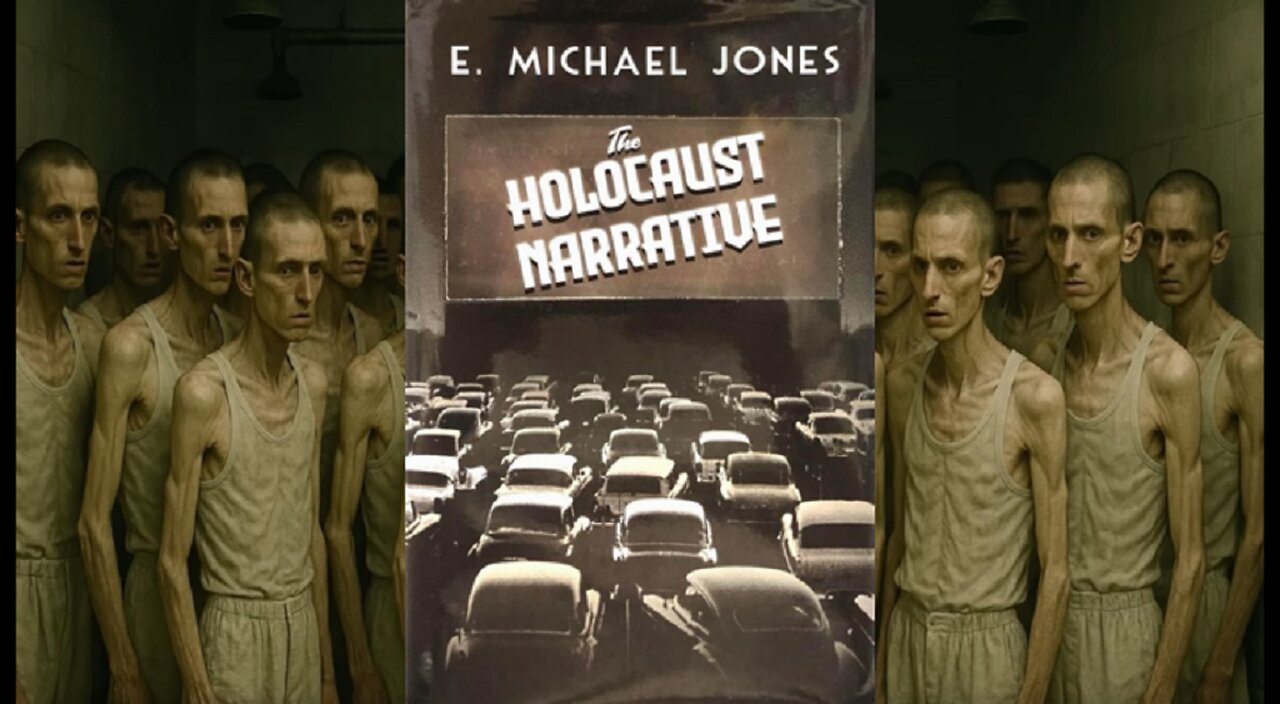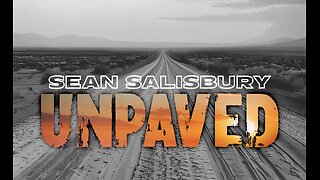Premium Only Content

Dr. E. Michael Jones ~Time To End The Fake Holocaust Narrative!
In the 1990s Norman Finkelstein critiqued the Holocaust industry which was built on those who did not suffer in the holocaust and yet sought social political and financial gain from it. Jones book examines the industry from the standpoint of literary criticism, highlighting and exposing the false narratives of that industry this book is necessary reading for anyone interested in an honest dialogue about the use and abuse of historical tragedies. Jones writes "Holocaust refers to being burnt whole. Elie Wiesel writes in Night that Jews were killed in flaming pits. We don’t hear about that anymore, do we? The term “Holocaust” originated in the ’70s from an American TV series. My wife was teaching in public schools, and a Jewish colleague, who would criticize my wife for wearing a crucifix, suddenly came to school wearing a badge that said, “We are all Zionists now.” The Holocaust story is the creation of a series of narratives that began with Allied and Hollywood propaganda campaigns in WWII to cover war crimes committed by Eisenhower and the Soviet Union, including Eisenhower’s Rheinwiesenlager and the fire storms engineered to burn alive entire populations of German and Japanese civilians. The Holocaust Narrative brings me back to my roots in literary criticism, where I determine the stories’ origins and purpose. I am examining literary artifacts, among them Anne Frank’s diary, William Styron’s Sophie’s Choice, and Jerzy Kosinski’s Painted Bird, and examining how the narrative changed over time. Steven Spielberg, for example, had water coming out of the showers in Schindler’s List. Is Spielberg a Holocaust denier or was he acknowledging that the Germans were meticulous about hygiene and had the highest level of modern hygiene in the world? As early as 1910, the Germans shaved the heads, showered, and fumigated the clothes of the Jews who reached their border in order to save their lives and prevent the typhus epidemics that inevitably occurred along their migratory path from the shtetls in the Pale of the Settlement. There were many imaginative descriptions of what happened that had to get formalized into a coherent narrative, and that was never accomplished. When the stories that make up the narrative can no longer be defended as factual, discussion about the Holocaust is criminalized. And that is where we find ourselves today." Dr Eugene Michael Jones (commonly known as E Michael Jones) was an Assistant Professor of American Literature at St. Mary’s College and is widely known for his critical views on contemporary cultural and religious issues. He was dismissed in 1981 due to his excellent anti-abortion stance, leading him to leave academia and start a magazine, initially named Fidelity and later Culture Wars, which focuses on the disarray in the Catholic Church including the subversion of the Catholic faith. The gist of the book
The term ‘Holocaust‘ has evolved over time, he argues, adding that various literary and propaganda influences including TV shows (like Holocaust, a miniseries starring Meryl Streep, which came out in the 1970s) and films have shaped our understanding of history. he word hadn’t really been used by anyone until around the 1970s and, as Jewish historian Norman Finkelstein pointed out to me, almost nothing had been written about it for the first 20 years. It took about two decades to write a book about the Holocaust but only three months to write about the sinking of the Titanic. Why? Dr Jones adds that some of the most influential WW2 figures like Eisenhower, Churchill and de Gaulle did not mention gas chambers or the genocide of Jews in their memoirs. In fact, in 2005, Richard Lynn—Professor Emeritus, University of Ulster—confirmed this: I've checked out Churchill's Second World War and the statement is quite correct—not a single mention of Nazi 'gas chambers,' a 'genocide' of the Jews or of 'six million' Jewish victims of the war.
Eisenhower's Crusade in Europe is a book of 559 pages; the six volumes of Churchill's Second World War total 4,448 pages; and de Gaulle's three-volume Mémoires de guerre is 2,054 pages. In this mass of writing, which altogether totals 7,061 pages (not including the introductory parts), published from 1948 to 1959, one will find no mention either of Nazi 'gas chambers,' a 'genocide' of the Jews or of 'six million' Jewish victims of the war.
Adolf Hitler was hated by the Allies, yet the three most significant Allied leaders—Churchill, de Gaulle and Eisenhower—said absolutely nothing about either death camps or extermination of Jews in their extensive post-war biographies. Why? In other words, 'holocaust' has changed in its meaning over the decades. It used to mean 'a burnt offering', which is no longer what it means. Wasn’t that a lost opportunity to completely bury the Führer? There is insufficient evidence to justify the statement regarding execution in gas chambers. —Foreign Relations of the United States: Diplomatic Papers, 1943 To make matters more interesting, the Red Cross found no evidence of gas chambers in Germany. More specifically, it’s a three-volume investigation called the Report of the International Committee of the Red Cross on its Activities during the Second World War, published in Geneva, 1948.
-
 LIVE
LIVE
Jeff Ahern
32 minutes agoFriday Freak out with Jeff Ahern
59 watching -
 LIVE
LIVE
Talk Nerdy Sports - The Ultimate Sports Betting Podcast
3 hours agoFriday Night Lights in BRAZIL 🇧🇷🔥🏈
50 watching -
 LIVE
LIVE
Reidboyy
1 hour ago$20 Billion Dollar Warzone Tournament! Protect The President
100 watching -
 1:15:26
1:15:26
Tucker Carlson
2 hours agoWhistleblower Exposes the Real Puppet Masters Controlling the State Department and Plans for Gaza
38.7K30 -
 LIVE
LIVE
StoneMountain64
2 hours agoHelldivers 2 just KEEPS GETTING BETTER
64 watching -
 2:10:10
2:10:10
The Culture War with Tim Pool
4 hours agoNational Guard Sent To Chicago - Fascism Or Salvation Debate | The Culture War with Tim Pool
146K166 -
 2:16:36
2:16:36
Side Scrollers Podcast
3 hours agoStreamer KICKED OUT of Renaissance Fair for Misgendering + Spiderman MELTDOWN | Side Scrollers Live
17.9K -
 LIVE
LIVE
Viss
2 hours ago🔴LIVE - Learn How To Dominate The Solo Battleground - PUBG
87 watching -
 1:35:52
1:35:52
Sean Unpaved
2 hours agoFumbles, Flubs, & Loogies: NFL Opener Chaos
14.2K -
 1:45:03
1:45:03
The Shannon Joy Show
2 hours ago🔥🔥Friday Freestyle! - MAGA Erupts Over Trump-Gates Bromance🔥🔥
8.21K6